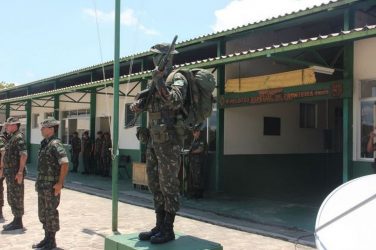Brazil should start this Monday a new week and the eight day with a crippling truck drivers strike that has brought Latin America’s largest economy to a screeching halt. This, despite the intervention of the Army and government’s concessions lowering the price of the diesel.
A truckers protest over diesel prices that has crippled key sectors of the Brazilian economy dragged into the weekend, putting drivers in a standoff with Brazilian President Michel Temer who authorized military force to clear highways.
Brazil’s largest city and economic hub, São Paulo, decreed a state of emergency, as did Rio de Janeiro. Gas stations and airports across the nation ran out of fuel, supermarket shelves went bare and hospitals said they were running out of supplies.
Public transport and trash collection was reduced or halted across the country, and many schools canceled classes as teachers could not get to work.
Lack of feed supplies may cause one billion birds and 20 million hogs to die, Brazilian meat group ABPA said.
“Those blocking the highways and acting in a radical manner are hurting the population,” Temer said in a televised address. “We will not allow hospitals to run out of supplies to save lives. We will not allow children to be harmed by the closure of schools.”
Yet Sunday night, much of the country remained paralyzed. In response to the threat of military action, Abcam, a Brazilian truckers association that says it represents 600,000 drivers, called on them to no longer block roads.
However, it encouraged the drivers to keep protesting and not deliver goods, meaning it was likely the situation would remain critical.
Negotiators for several trucker groups agreed late on Thursday to suspend their blockages for 15 days after the government vowed to subsidize and stabilize diesel prices, which may cost 5 billion reais (US$ 1.4 billion) this year.
To win over truckers the government promised to extend for 60 days a 10% diesel price cut announced by state-led oil company Petrobras. Shares of Petrobras, as the company is known, closed down nearly 1.4% on Friday after plunging 19% in the prior two days, as the blockades continued.
But the Abcam trucking association that ignited the strike was not among the parties that signed the accord and insisted on Friday it would not do so until Congress puts diesel tax cuts into law, which would take several days at the quickest.
No trucks were able to enter the port of Santos, Latin America’s largest, and oilseeds crushing group Abiove anticipated that soy exports would halt on Saturday if truckers did not allow access to major ports. Meat group ABPA said 152 poultry and pork processing plants had indefinitely suspended production.
Auto production in Brazil, which contributes about a quarter of industrial output, ground to a halt on Friday in the latest blow to a fragile economic recovery following the worst downturn in decades.
Amnesty International
Brazil’s federal government must halt its deployment of the military to clear highways blocked by striking truck drivers, Amnesty International said.
The order, announced on Friday afternoon, represented the first time that the Brazilian government has authorized the Armed Forces to enforce the law and halt civic disruption at national level since the end of the military regime in 1985.
“The role of the armed forces is not to break up protests, assemblies or strikes. The state must respect our human rights to freedom of expression and peaceful assembly,” said Jurema Werneck, Executive Director at Amnesty International Brazil.
“The protesters and the appropriate authorities must negotiate a peaceful resolution to any disagreements. Sending in the military is a disproportionate response to this strike that could lead to a serious escalation of violence.”
Security Forces
The Brazilian government authorized the use of federal security forces where protesting truckers refrain from freeing the roads blocked as part of their countrywide rallies.
The announcement was made by Temer at the Planalto presidential palace after a meeting with cabinet members and the president.
“I’d like to unveil an immediate security plan to mobilize federal security forces to unblock the roads, and I’m requesting state governors to follow suit. We will not allow the population to be deprived of basic need items, hospitals to be deprived of supplies to save lives, and children to be deprived of school.
“Those blocking the road in radical fashion will be held accountable for it. As always, the government has the courage to negotiate; now it will have the courage to resort to its authority in defense of the Brazilian people,” the president stated.
Temer’s ministers announced earlier a deal, which included the suspension of the protests carried out by the truckers for 15 days. However, not all of the truck drivers’ associations accepted the proposal.
In São Paulo, pickup trucks and trucks are still seen lined up by the curb. This is also the case in the states of Paraná, Santa Catarina, and Rio Grande do Sul, where protests are being staged in 74 locations. In the Federal District, the police reported demonstrations on four highways.
In the deal between the government and the truck drivers’ representatives, the stoppage was to be suspended for 15 days. Petrobras, in turn, agreed to keep the 10% reduction in the diesel price at the refineries for 30 days, while the government seeks ways to cut prices.
Petrobras is reiterating its commitment to afford the discount – estimated at over US$ 95 million – in the first 15 days. The following 15 days will be financed by the government.
The government also pledged predictable monthly prices by the end of the year, with no changes to Petrobras’s pricing policies, and will also subsidize the price differences from prices fixed by the firm each month.
“When the diesel price at the refinery drops and stays under what has been set, Petrobras has a credit that reduces the costs of the Treasury,” Finance Minister Eduardo Guardia said.
Representatives from truck drivers’ associations call for the end of the tax burden on diesel. They expect the Senate to approve the exemption from some taxes on diesel up to the end of the year.
The matter was approved yesterday by the lower house and should now be submitted to the Senate. Should it be approved, the exemption from these taxes will have to be further sanctioned by the president.
Leaders Diverge
In the second meeting with representatives from eleven truck driver trade unions, the government attempted to come to an agreement, but not all of those in attendance accepted the deal.
José Fonseca Lopes, a representative from the Brazilian Association of Truck Drivers, rejected the proposal brought forth by the government to suspend the strike for 15 days to a month while the government continues to seek a solution to the problem with diesel prices.
Lopes said that other union leaders welcomed the government’s suggestion, but he did not, and left the meeting before it was over. The association chaired by Lopes represents 700 thousand truckers, with 600 trade unions spread throughout Brazil.
While the meeting was taking place at the Planalto presidential palace, Wallace Landim, a union leader representing autonomous drivers in the country’s Central-West, said his trade had no representation in the meeting and that no decision made in it would be taken into consideration. His stance is similar to that of Lopes – blockages should continue until the taxes levied on diesel are eliminated.
In a statement made Thursday (May 24), Fonseca Lopes, president of the Brazilian Truck Drivers’ Association, said that the protests will only be brought to an end after President Michel Temer confirms the lower house decision to abolish another tax on diesel.
The government had already agreed with Congress to eliminate one of the taxes-a move now awaiting a presidential decree to become effective.
The other tax, pending approval from Congress, is yet to be approved by the Senate before being okayed by the president.
MP/ABr





